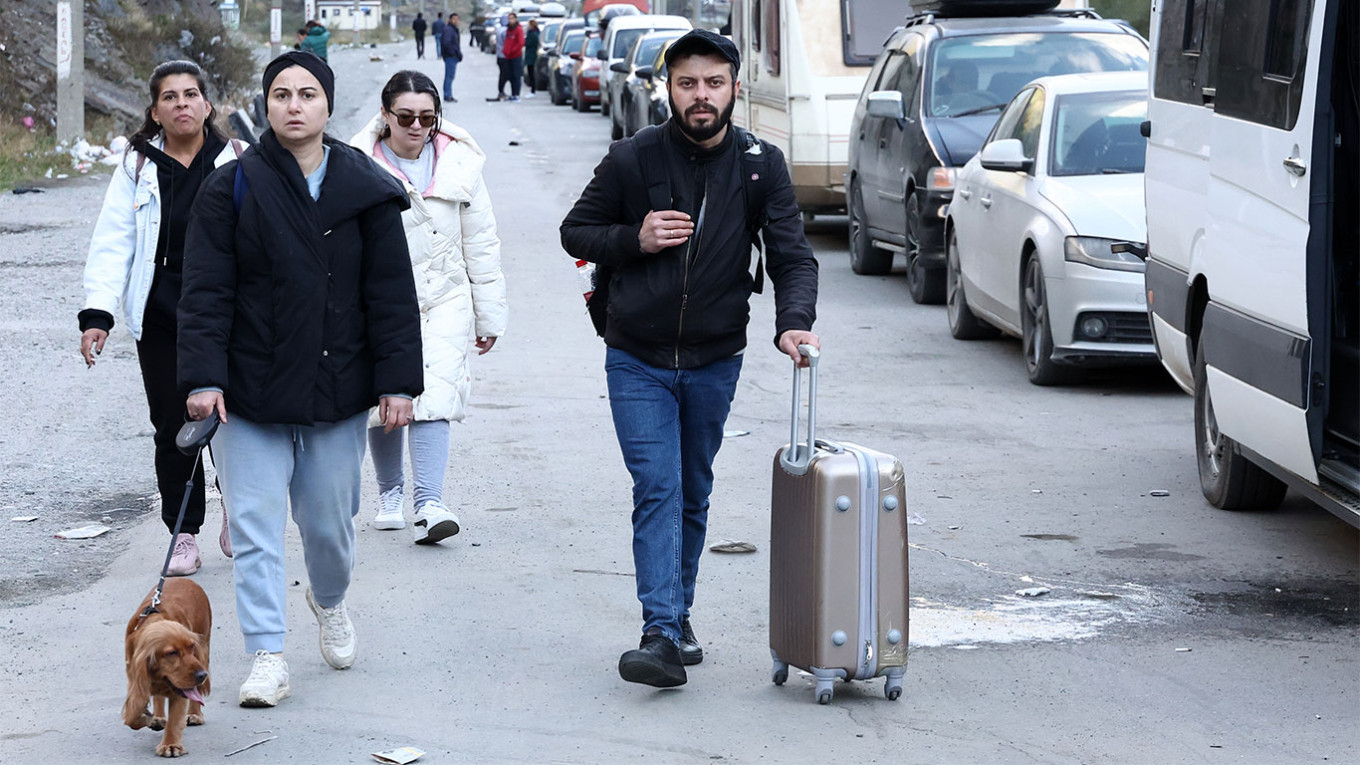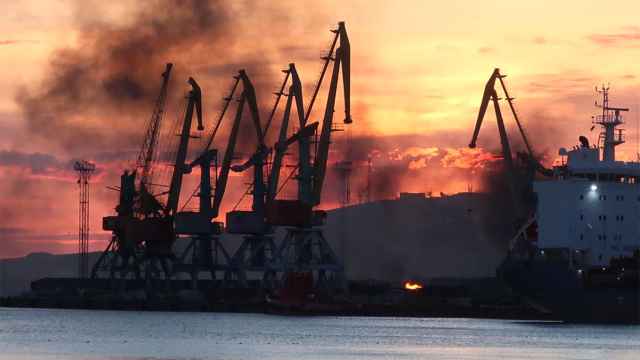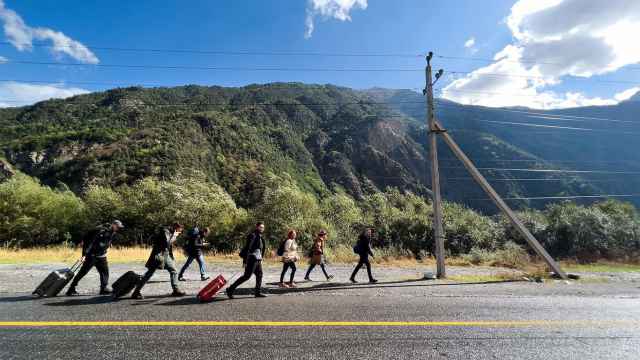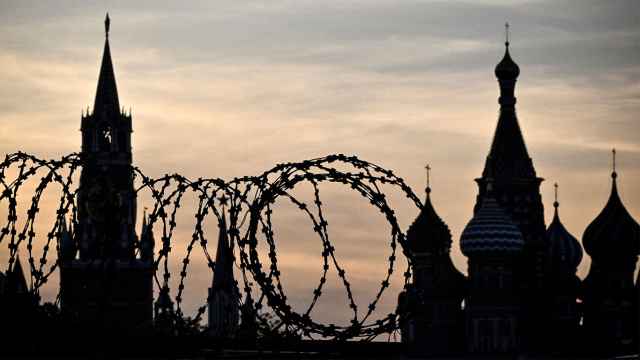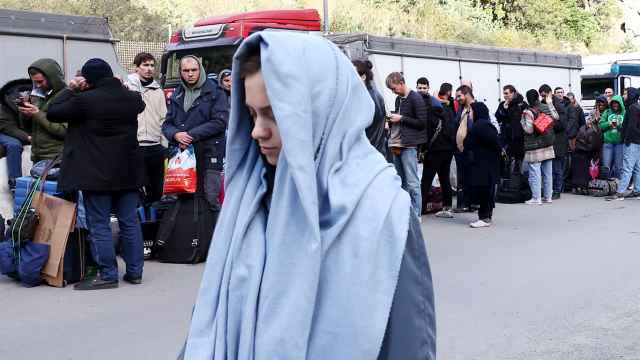Another day, another round of criticism of Russian refugees. Since the Kremlin sent tanks over the border last year, Russians who fled abroad in protest at the war are regularly attacked for their perceived imperialism — or their apparent indifference to the terrible death and destruction in Ukraine. From exiled opposition leaders and actors to academics and commentators, anyone attacked in this way is immediately swamped by a wave of online hostility.
While some of this criticism goes too far, some of it is undoubtedly fair. Either way, it is still victim-blaming.
Can you compare what Ukrainians have experienced and what Russian refugees have experienced during the war in Ukraine? No, they are from different universes. Ukrainians are slaughtered by Russian missiles and bombs; they are killed, raped and tortured by occupying forces; Ukrainian kids are kidnapped and brainwashed in Russian captivity; Ukrainian cities and villages are destroyed. It is true that refugees from Russia have lost their homes, jobs, wealth, social connections and cannot visit their parents and relatives — but they are not being bombed, tortured or killed.
Still, Russian refugees are victims. Telling them that they are not victims is like telling a woman who has been beaten up by her husband: “It’s OK, he didn’t kill you.” We are lesser victims, but victims nonetheless. Blaming us for what happened to them is nothing less than victim-blaming.
When I was in Kyiv last month, every person I spoke to — and I spoke to dozens — had friends or relatives who volunteered to fight in 2022. Many had gone to funerals for loved ones killed in the war. In contrast, not one Russian — either abroad or in Moscow — with whom I have spoken over the last year has had a loved one die in Ukraine. And my social circles in Kyiv and Moscow are basically the same — academics, students, journalists, intellectuals and businesspeople.
Put another way: the Russian elite’s direct exposure to the war is far more limited than that of their Ukrainian counterparts. This is likely one of the reasons that some Russians become fixated on their own small tragedies and forget about the bigger tragedy unfolding in Ukraine. Still, their small tragedies are real tragedies nonetheless.
Some Russian refugees are rich, some are well-connected, some are talented and have no problems finding a well-paid, permanent job abroad. Some of them look happy and sound cheerful. This does not mean they are not refugees. They are still refugees. Blaming them for being happy or carefree is like saying: “I can’t believe she was abused at home. She’s always looked so happy and cheerful.”
I would even extend this logic to a widely despised category — very rich Russian exiles. Of course, it’s hard to feel empathy for a person sitting in London or Dubai with billions of dollars in investments and properties. Yet, some of these people have seen their lives totally ruined by the Russia-Ukraine war and its fallout.
A lot of money that was made in Russia in the 2000s was not made from privatizing resources on the cheap or profiteering from state contracts (like Putin’s friends). A lot of rich Russian exiles actually earned their money by building new businesses — particularly in telecommunications, retail and financial services. Some of them thought they were helping to build a new, better Russia. The war destroyed their dreams and their life’s work lies in ruins — even if they still live in palaces and fly around the world in their private jets. While they might appear last in a list of victims, they are, nonetheless, victims.
Russian refugees are easy targets. When you criticize Putin, his erstwhile supporters, his agents or useful idiots in the West, you run certain risks. Perhaps you will find yourself attacked by an army of paid trolls or suffer the vitriol of Russian internet Nazis — you may even attract the attention of the Russian state. On the other hand, when you criticize Russian refugees for doing nothing, focusing on their troubles or just looking happy, there will be no trolls, no vitriol and no attention from the Russian state.
Last and by no means least, some Russian refugees do share responsibility for the current regime and the war in Ukraine. As a Russian public intellectual and as a university professor in my past life in Moscow, I feel this responsibility. Maybe if I’d written more columns, done more public lectures or spoken even more critically about Putin and his regime, it would have made a difference. Maybe not. In my experience, many Russian intellectuals in exile are thinking along similar lines at the moment. Yet, even if they are deemed responsible for not doing enough to stop the war, they are still victims.
It almost goes without saying: If you can help, you should help Ukrainians who are in far more dire need than anyone else in this war. If you have money to donate — donate to those who are defending Ukraine on the battlefield, those who are providing medical help to Ukrainian victims of the Russian invasion, those who are sustaining Ukraine’s universities in these terrible times, those who support Ukrainians who have lost their homes and so on. The needs of those suffering the most come first.
But supporting and helping refugees from Russia is also a good deed. When looking at which scholars to help after the outbreak of the war, my current employer, the University of Chicago, of course prioritized Ukrainians. Yet after Ukrainians, it also offered help to Russian refugees. That is how it should be.
A Message from The Moscow Times:
Dear readers,
We are facing unprecedented challenges. Russia's Prosecutor General's Office has designated The Moscow Times as an "undesirable" organization, criminalizing our work and putting our staff at risk of prosecution. This follows our earlier unjust labeling as a "foreign agent."
These actions are direct attempts to silence independent journalism in Russia. The authorities claim our work "discredits the decisions of the Russian leadership." We see things differently: we strive to provide accurate, unbiased reporting on Russia.
We, the journalists of The Moscow Times, refuse to be silenced. But to continue our work, we need your help.
Your support, no matter how small, makes a world of difference. If you can, please support us monthly starting from just $2. It's quick to set up, and every contribution makes a significant impact.
By supporting The Moscow Times, you're defending open, independent journalism in the face of repression. Thank you for standing with us.
Remind me later.



